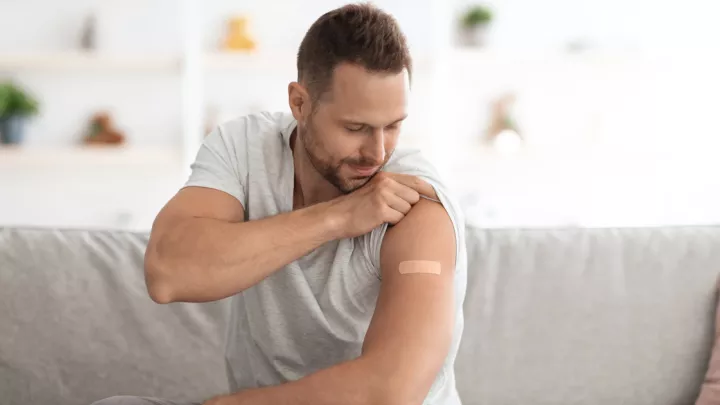Fall 2024 update for flu, COVID-19 and Mpox

As we head into autumn, it's time to take stock of the current landscape of infectious diseases that have dominated headlines in recent years.
Infectious diseases and critical care physician Kelly Cawcutt, MD, MS, provides the latest information on influenza, COVID-19 and Mpox.
Flu: Prepare now
The Southern Hemisphere's experience often serves as a preview for what the Northern Hemisphere might face, according to Dr. Cawcutt.
“This year, the flu season in the Southern Hemisphere caused high levels of illness, primarily driven by influenza A, which tends to cause more severe illness,” she says. "I think there is a fair amount of concern that we're going to see the flu season be significant this year.”
Flu vaccines
Given the potential for a significant flu season, individuals may want to consider getting a flu shot sooner rather than later.
"We generally recommend influenza vaccines to be given in September or October because that usually predates the beginning of flu season," Dr. Cawcutt says. “We’re not in full flu season yet, so there is time, but remember, it does take about two weeks to get full effect from any influenza vaccination. Even if you wait, though, and flu season has started, it does not mean it's too late to get the flu vaccine.”
Flu vaccines are updated each year to match the most circulating influenza virus strains. This year's flu vaccine is a trivalent vaccine, meaning it contains three strains of influenza.
"Historically, we have had quadrivalent vaccines, which mean there's four different strains,” Dr. Cawcutt explains. “This year, it's three different strains, not because one of those wasn't effective, but because that fourth strain hasn't been circulating since 2020.”
While the exact effectiveness of the vaccine against the latest strains won't be known until flu season begins, Dr. Cawcutt says that, even in years with lower match percentages, the vaccine still provides clear benefits in reducing the severity of illness.
Avian flu: A cause for concern?
While not currently a major threat to humans, avian influenza is being closely monitored.
“So far, thankfully, most cases of avian influenza we’ve seen have been mild and have not required hospitalization,” Dr. Cawcutt says. “It does not appear to be spreading quickly in a human-to-human form, but there's a lot of close attention on that."
For those in agricultural areas or with potential exposure to birds, it's important to be aware of the risk. If you develop flu-like symptoms after exposure to birds, cattle or another infected person, inform your health care provider, as special testing may be required to identify avian influenza.
COVID-19: Continuing vigilance
The country has recently seen a summer surge of COVID-19, with increased cases, hospitalizations and deaths.
“Locally, we have not seen as many hospitalizations for COVID-19-related disease, which is fantastic and speaks to immunity and some factors related to the current variants," Dr. Cawcutt says. “However, this does not mean there is not continued value in vaccination to decrease severity of illness should you contract COVID-19.”
Despite lower hospitalization rates, COVID-19 remains prevalent in many Nebraska communities. Wastewater data for the state indicates high levels of virus circulation in some areas.
Updated vaccines and recommendations
The good news is that updated COVID-19 vaccines are now available from Pfizer, Moderna and Novavax. These new vaccines have been designed to target the most recent circulating strains, providing better protection against severe disease, hospitalization and death.
For those who have recently had COVID-19, Dr. Cawcutt advises that it's generally fine to get vaccinated once you've fully recovered from your illness, typically after a week or two. However, if you've received a COVID-19 vaccination recently, it's recommended to wait four months between vaccines.
The updated vaccines are recommended for individuals 6 months and older for Pfizer and Moderna and 12 years and older for Novavax.
Mpox: Staying aware
Mpox is a virus normally linked to travel in West and Central Africa. Mpox is classified into two main groups: clade 1 and clade 2.
The World Health Organization recently declared a public health emergency due to a surge in Mpox cases in the Democratic Republic of the Congo, or DRC.
"The current outbreak happening in DRC is the clade 1 side of Mpox, which is more severe and can cause more systemic illness and carries a higher risk of death," Dr. Cawcutt says.
It's important to note that this outbreak involves a different, more severe strain of Mpox than what was seen in the U.S. in recent years. While no cases of this strain have been identified in the U.S. yet, other countries have reported sporadic cases related to travel.
The risk remains low for the general public in the U.S. and while there are Mpox vaccines, they are not currently recommended. However, Dr. Cawcutt advises, "I think it's really about keeping a level of awareness. My biggest concern is people who might be traveling to or from Africa.”
Dr. Cawcutt advises those traveling to Africa to be evaluated at a travel clinic. There, they can receive counseling and be considered potential travel-related vaccinations and prophylaxis, based on their travel activities and plans.
Returning travelers should seek care if they become ill with a fever over 99.5 degrees Fahrenheit. They should also reach out to their providers with any known exposures to illnesses.
Staying informed and making decisions
When navigating the complex landscape of infectious diseases, staying informed through reputable sources is crucial.
"I would recommend people stick to known entities,” Dr. Cawcutt says. “So, locally, talk to your physician; that's a great place to start. But in addition, look to information coming out from institutions like Nebraska Medicine and UNMC."
She also emphasizes the importance of vaccination: "As a health care community and infectious diseases physician, I recognize that there's been a change in the level of concern about vaccines and their safety and effectiveness, and whether people should get them or not. But they are safe and effective. They do help prevent disease and more severe levels of illness."
Dr. Cawcutt adds that she and her family receive vaccinations, along with many members of the health care community.
“There is a clear benefit,” she says. “Millions and millions of doses have been given and demonstrate a high level of safety, based on the number of people who have received these vaccines.”
Staying informed, following public health guidelines and considering vaccination options for flu and COVID-19 remain key strategies in protecting individual and community health.
Vaccines can be administered by your primary care doctor at your next appointment or at your local pharmacy. To make an appointment, call 800.922.0000 or schedule online.







